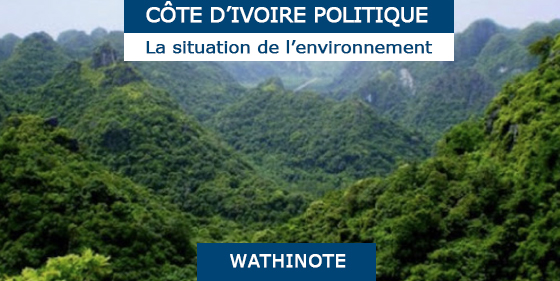Authors : Allan Ngari, Duncan E Omondi Gumba
Affiliated organization : Institute for Security Studies (ISS) Africa
Site of publication : issafrica.org
Type of publication : Article
Date of publication : 31 May 2022
*Les Wathinotes sont des extraits de publications choisies par WATHI et conformes aux documents originaux. Les rapports utilisés pour l’élaboration des Wathinotes sont sélectionnés par WATHI compte tenu de leur pertinence par rapport au contexte du pays. Toutes les Wathinotes renvoient aux publications originales et intégrales qui ne sont pas hébergées par le site de WATHI, et sont destinées à promouvoir la lecture de ces documents, fruit du travail de recherche d’universitaires et d’experts.
Côte d’Ivoire is the world’s top cocoa producer, but the country’s principal economic activity is driving devastating deforestation, which harms the environment and feeds the illicit timber trade.
Cocoa expert Simon Nanga told the ENACT organised crime project that farmers typically relied on natural soil fertility in virgin forests for high cocoa yields. Natural soil has better nutrients than already-farmed cocoa fields. This leads to forests being cleared to allow for cocoa cultivation.
After five to 10 years, soil fertility dwindles and farmers move to the next fresh two to three acres of virgin forest to plant a new crop. This is replicated in many parts of east-central and western Côte d’Ivoire, leading to a growth of towns and villages in protected forest areas.
To diversify and increase their income, some farmers make profitable deals with logging companies and illegal timber traders to remove trees to make way for cocoa crops.
Côte d’Ivoire lost 47 000 hectares of forest in its cocoa belt in 2020 alone, a rate that experts argue could see a total depletion of the country’s forest cover by 2034.
Illegal cocoa-related logging wipes out endangered tree species such as teak, framiré and gmelina, which are covered by strict international trade regulations. Illicit cocoa-related logging has also caused massive biodiversity and wildlife losses in Côte d’Ivoire, notably among elephants and primates. Corruption and system weaknesses facilitate unlawful logging in areas designated for timber extraction, most of which are also cocoa-producing areas.
Côte d’Ivoire lost 47 000 hectares of forest in its cocoa belt in 2020 alone, a rate that experts argue could see a total depletion of the country’s forest cover by 2034
In the absence of systematic law enforcement, illegal loggers produce most of the timber used across various industries, which strips income from the economy.
The Ministry of Water and Forests estimates that illicit networks produce 15 to 30 times more timber than formally licensed traders, making illegal logging worth more than €33.5 million annually – about 7% of the country’s GDP.
There have been international interventions to address cocoa-related environmental degradation, including illegal logging. Global consumer demand has led to the certification of cocoa, a new approach used by multinational companies to ensure sustainability. However, certification limits some cooperatives to niche markets such as fair trade or organic farming. Certification is also prohibitively expensive for most farmers and their associations.
The Ministry of Water and Forests estimates that illicit networks produce 15 to 30 times more timber than formally licensed traders, making illegal logging worth more than €33.5 million annually – about 7% of the country’s GDP
Côte d’Ivoire has made numerous official commitments to international standards that include the European Union Timber Regulation, the New York Declaration on Forests and other global initiatives. However, this high-level political will is undermined by weak law enforcement. Organised crime networks exploit fraudulent practices and corruption by officials who accept bribes at every stage of the timber supply chain, from logging to transportation and sale.
Reforestation is addressed in the government’s 2018 Forest Preservation, Rehabilitation and Expansion National Policy. The policy aims to restore forest cover to 20% of the national territory by 2030 in protected areas, which cocoa farmers are urged to move away from. It includes an ambitious €940 million master plan to deter cocoa-related deforestation and illegal logging.


Commenter